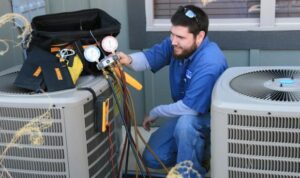Venturing into the realm of top air conditioner brands in the market, this introduction sets the stage for an informative and intriguing journey, delving into the key players dominating the industry with their innovative technologies and customer-centric approaches.
Providing a comprehensive overview of the landscape, this paragraph aims to captivate readers and spark their curiosity about the nuances of the air conditioning market.
Top Air Conditioner Brands in the Market
When it comes to choosing an air conditioner, selecting a reliable brand is essential for ensuring quality, durability, and efficiency. Let's explore the top 5 air conditioner brands currently dominating the market and compare their key features and technologies offered.
1. Daikin
Daikin is known for its innovative technology and energy-efficient air conditioners. Their models come with features like inverter technology, intelligent sensors for optimizing performance, and advanced air purification systems. Daikin has a strong reputation for providing reliable products backed by excellent customer service.
2. LG
LG offers a wide range of air conditioners known for their durability and performance. Their models often include features like dual inverter compressors for energy savings, Wi-Fi connectivity for smart control, and advanced cooling technologies. LG has garnered positive reviews for their user-friendly designs and effective cooling capabilities.
3. Mitsubishi Electric
Mitsubishi Electric is a trusted brand in the air conditioning industry, offering high-quality products with cutting-edge technology. Their air conditioners are known for their quiet operation, superior air distribution, and energy efficiency. Customers appreciate the reliability and performance of Mitsubishi Electric units.
4. Panasonic
Panasonic is a well-established brand known for its innovative air conditioning solutions. Their models feature nanoeTM technology for air purification, Econavi sensors for energy conservation, and powerful cooling performance. Panasonic air conditioners are praised for their durability and effectiveness in maintaining comfortable indoor climates.
5. Carrier
Carrier is a renowned brand with a long history of providing top-notch air conditioning systems. Their products are equipped with features like variable-speed compressors, humidity control, and smart thermostats for enhanced comfort and efficiency. Carrier has built a solid reputation for delivering high-performance air conditioners with reliable performance.
Energy Efficiency and Sustainability
When it comes to energy efficiency and sustainability, the top air conditioner brands in the market prioritize these aspects in their products. They understand the importance of reducing energy consumption and minimizing environmental impact.
Focus on Energy Efficiency
- Utilization of inverter technology to adjust compressor speed based on cooling needs, leading to reduced energy usage.
- High Energy Efficiency Ratio (EER) and Seasonal Energy Efficiency Ratio (SEER) ratings for optimal performance.
- Smart features like programmable thermostats and energy-saving modes to enhance efficiency.
Sustainability Initiatives
- Usage of eco-friendly refrigerants like R-410A, which have lower Global Warming Potential (GWP).
- Implementation of recycling programs for old units to reduce waste in landfills.
- Investment in research and development for greener technologies and manufacturing processes.
Eco-Friendly Practices
- Integration of green building certifications like LEED (Leadership in Energy and Environmental Design) in manufacturing facilities.
- Reducing carbon footprint through energy-efficient operations and sourcing sustainable materials.
- Partnerships with environmental organizations to promote sustainability and conservation efforts.
Innovation and Technology
In the competitive market of air conditioners, top brands are constantly pushing the boundaries of innovation and technology to offer cutting-edge solutions to consumers. These brands are not only focusing on cooling capabilities but also integrating smart features like IoT connectivity and AI technology to enhance user experience and energy efficiency.
Latest Technological Advancements
- Variable Refrigerant Flow (VRF) Systems: Brands like Daikin and Mitsubishi Electric have introduced VRF systems that allow for individual control of multiple indoor units, providing precise temperature control and energy savings.
- Advanced Filters and Air Purification: Companies like LG and Panasonic have incorporated advanced filtration systems and air purification technology in their air conditioners to improve indoor air quality and remove harmful particles.
- Inverter Technology: Brands such as Samsung and Carrier have implemented inverter technology in their units, which adjusts compressor speed based on cooling demand, resulting in energy efficiency and quieter operation.
Smart Features Implementation
- IoT Connectivity: Brands like Haier and Whirlpool offer air conditioners that can be controlled remotely through smartphone apps, allowing users to adjust settings, monitor energy usage, and receive maintenance alerts.
- AI Technology Integration: Companies such as Hitachi and Panasonic are incorporating artificial intelligence in their air conditioners to analyze usage patterns, optimize performance, and provide personalized comfort settings for users.
- Voice Control and Integration: Brands like LG and Carrier have introduced voice control features in their air conditioners, enabling integration with virtual assistants like Amazon Alexa and Google Assistant for hands-free operation.
Role of Innovation in Competitiveness
Innovation plays a crucial role in the competitiveness of top air conditioner brands as it allows them to differentiate their products in the market, meet evolving consumer demands, and stay ahead of competitors. By constantly introducing new technologies and features, these brands can attract tech-savvy consumers and establish themselves as industry leaders in the HVAC sector.
Product Range and Market Segmentation
In the competitive air conditioner market, top brands offer a wide range of products to cater to diverse consumer needs. Let's take a closer look at how these brands segment their products and their pricing strategies.
Different Types of Air Conditioners Offered
- Split Air Conditioners: Top brands like Daikin, Mitsubishi Electric, and LG offer split air conditioners that are popular for their energy efficiency and quiet operation.
- Window Air Conditioners: Brands like Carrier, Frigidaire, and Haier provide window air conditioners that are easy to install and suitable for smaller spaces.
- Portable Air Conditioners: Companies such as Honeywell, Black+Decker, and Whynter offer portable air conditioners that can be moved from room to room, providing flexibility.
Market Segmentation Strategies
- Targeting Different Consumer Segments: Brands segment their products based on factors like room size, cooling capacity, and budget to meet the diverse needs of consumers.
- Customized Features: Some brands offer advanced features like smart connectivity, air purification, and energy-saving modes to target specific consumer preferences.
Pricing Strategies
- Premium Range: Brands like Mitsubishi Electric and Daikin position their high-end models as premium products with advanced technology and features, pricing them accordingly.
- Mid-Range Options: Brands like LG and Carrier offer mid-range air conditioners with a balance of performance and affordability, targeting a broader consumer base.
- Budget-Friendly Choices: Brands like Haier and Frigidaire focus on providing budget-friendly air conditioners without compromising on quality, appealing to cost-conscious consumers.
Final Wrap-Up
Wrapping up our exploration of the top air conditioner brands in the market, this conclusion encapsulates the essence of the discussion, highlighting the significance of brand reputation, technological advancements, and market strategies in shaping the competitive landscape of the industry.
Helpful Answers
How do energy efficiency and sustainability play a role in the top air conditioner brands?
Energy efficiency and sustainability are paramount for these brands, with a focus on reducing carbon footprint and energy consumption through advanced technologies like inverter compressors and eco-friendly refrigerants.
What are some examples of innovative features offered by these top air conditioner brands?
These brands showcase cutting-edge features such as smart thermostats, air quality sensors, and remote access capabilities, enhancing user experience and comfort levels.
How do top air conditioner brands segment their products to cater to diverse consumer needs?
By offering a range of air conditioner types like split, window, and portable units, these brands ensure they meet various consumer preferences and requirements, from compact solutions to powerful cooling systems.
What pricing strategies do top air conditioner brands adopt for different product ranges?
Top brands often employ tiered pricing models based on features, capacity, and energy efficiency, providing consumers with options that align with their budget and performance expectations.






